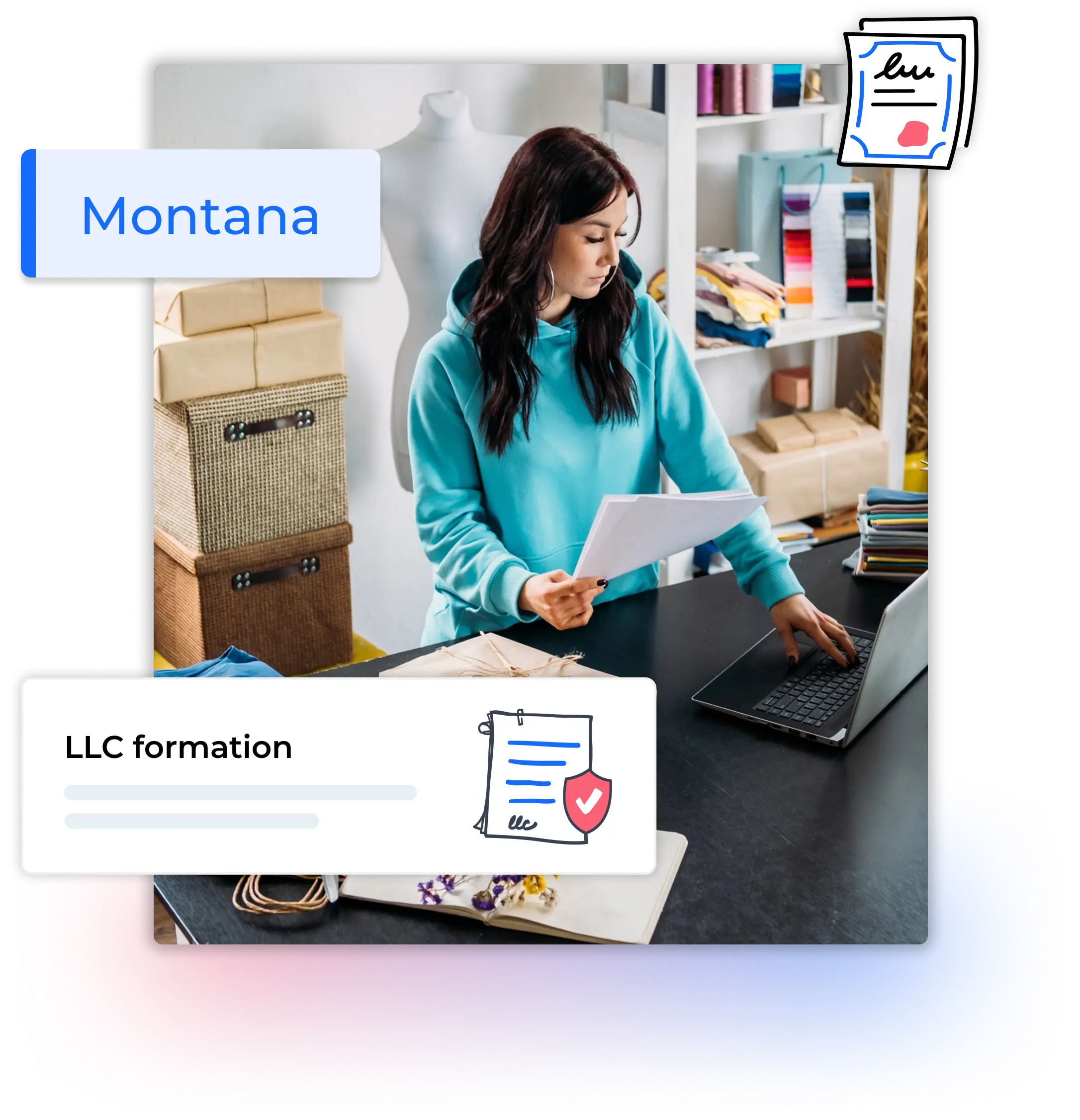Quick facts about forming a Montana LLC
| Filing Fee | $35 (online only) |
| Processing Time | Typically 1-2 business days |
| Annual Report Fee | $20, due each year by April 15 |
| Registered Agent Required | Yes, must have an Montana physical address |
| State Franchise Tax | None for LLCs |
| Business License | No statewide general business license, but local requirements may apply |
| Managing Authority | Montana Secretary of State, Business Services |
How to start an LLC in Montana in 5 simple steps
Are you thinking of starting your business in Montana? There are several benefits of forming a limited liability company, such as minimizing the risk of personal liability in the event that someone sues your business. In the text below, we’ll cover how to start an LLC in Montana, going over everything you’ll need to know to officialize your business.
- Name your Montana LLC
- Choose a registered agent
- File articles of organization
- Create an operating agreement
- Apply for an EIN
Now let’s dive in and examine each and every step.
Step 1: Name your Montana LLC
Customers will know you by name, so it’s important to choose one you like and that best represents your brand when you start your new business. It should be easily distinguishable from the brand names of your competitors, because you run the risk of being sued for copyright or trademark infringement if your business name is too similar to a competitor’s. Additionally, your name needs to be recognizable enough that it stands out from the crowd and is easy to remember. You need to make sure the name you choose is available to use in the state, which can be done by a Montana business entity search on the Secretary of State’s website.
While it’s possible to change your business name later on, this may be difficult and costly to do. This is especially true if you’ve already had a lot of branded items made, set up financial accounts in the company’s name, or filed legal forms with your business moniker. You should be prepared to choose a name at the beginning of your entrepreneurship that will remain with your company long-term. Your name or slogan also needs to do a good enough job of describing the products or services the company offers and what you’re bringing to the table that no one else is.
Step 2: Choose a registered agent
A Montana registered agent is a designated person who sends and receives legal paperwork on behalf of your LLC. The name of your registered agent, their contact information, and the physical address of your company’s registered office must be included when you register a business.
Any Montana resident over the age of 18 can serve as your company’s registered agent. To qualify, your registered office must not be a P.O. box and must be a physical location. Your registered agent must be reasonably available at the registered office during typical business hours.
The owner of a business can serve as the company’s registered agent. To do this, you only need to use your own name and home or office address rather than the name and address of another individual. While this may seem straightforward, acting as a registered agent is time-consuming and could be problematic for emerging business owners who are undergoing rapid expansion. If you do not have a dedicated registered agent in Montana, you will be required to put your own name and home or office address down when you file your articles of organization.
When you employ the services of a professional registered agent, you will put the address of their business on your articles of organization. Because this identifying information is advertised together with your company name so that anybody servicing your firm may reach you, having a registered agent who is someone other than yourself is likely to be more beneficial for you and your business.
This also protects your home address from becoming public information. It’s also helpful to hire a professional registered agent if you prefer to work unconventional hours. Registered agents are legally required to be available during business hours, and this often doesn’t work for new owners.
Step 3: File articles of organization
Articles of organization in Montana is a legal documentation that contains information about how the business will be structured and how it will operate. The documents must be approved by the Montana Secretary of State in order for the LLC to be formally recognized as a legal entity. When you file articles of organization for your company, it establishes the business as a separate legal entity from the business’s owner and legally registers the organization as a limited liability company with the state.
Four types of LLCs are recognized in the state of Montana:
- Limited Liability Company
- Professional Limited Liability Company (PLLC)
- Series Limited Liability Company
- Professional Series Limited Liability Company
For organizations that employ licensed professionals like lawyers, physicians, and architects, the PLLC designation may be required. Series LLCs are available in Montana to allow new LLCs to branch out from one parent LLC.
State fees
The Montana LLC cost for filing the articles of organization in the state is $35. Once your LLC is registered in the state, you will need to file a Montana LLC annual report and pay the filing fee.
Requirements
To complete the articles of organization, you must include the following information:
- The name of your business and the type of LLC it will be
- The name and contact information of your registered agent and the location of the registered office
- The purpose of your business
- The term of your LLC
- The type of governing authority your LLC will have
How to file
To file articles of organization in Montana, you must go online and visit the state’s ePass website, where you will create an ePass that you can use to file the documents for your new business as well as other transactions with the state.
Step 4: Create an operating agreement
Once you’ve filed your articles of organization with the Montana Secretary of State, it’s recommended to draft an operating agreement for your Montana LLC.
What Is an operating agreement, and do you need one?
An operating agreement serves as a sort of compass that helps you manage your company’s operations and fulfill the demands of your members. All LLC members must sign the operating agreement, and once this has been done, they are legally obligated to adhere to the contract’s terms and conditions. In most cases, an LLC member who no longer wishes to be a member can leave this type of contract only if the other members who also signed the agreement permit it.
If a dispute arises between two or more members of the LLC, you can refer to the operating agreement for clarification and guidance on how the matter ought to be handled in accordance with your company’s goals and objectives.
Here are some things you may want to add to your Montana LLC operating agreement:
- Who are the members of your LLC at this time?
- How much interest does each LLC member have in the business?
- How do LLC members distribute and absorb company profits and losses?
- How much money will each member of the LLC contribute to the business?
- What authority do LLC members have over one another, and what voting rights does each member have?
- How will you structure your company’s management?
- What role will each member of the LLC have in the company?
- What process must a member go through to exit the LLC?
- How can new members apply to the business for LLC membership?
- How and when will business meetings be conducted each year?
- How and when will votes be held among members of the company?
- What occurs when an LLC member dies, is severely injured, or otherwise becomes incapacitated?
- How can an LLC member liquidate their interests in the business?
Is an operating agreement required in Montana?
Montana state law does not require limited liability companies to have operating agreements on file. That said, this document is necessary for other critical parts of your business, such as obtaining a bank account specifically for business transactions and activity. An operating agreement “need not be in writing,” per MCA 35-8-109. A verbal agreement, on the other hand, won’t help your business much, largely because it means next to nothing in a court of law.
Without a properly established operating agreement, the state of Montana determines how your business operates and what laws, restrictions, and standards apply to the company.
Step 5: Apply for an EIN
If your business currently has workers or will have them in the future, you need to apply for an Employer Identification Number, or EIN. The only way to opt out of having an EIN is to operate a sole proprietorship in which the only employee is yourself and you use your own Social Security number instead of an Employer Identification Number. Here’s what to know about getting an EIN for your Montana LLC.
An EIN is a business-specific version of a Social Security number. The Internal Revenue Service of the United States (IRS) requires companies to have an Employer Identification Number (EIN), so they can easily identify a particular business. This number is nine digits long and appears like so: XX-XXXXXXX.
With sole proprietorships as the only exception (and single-member LLC without employees), you will need an EIN if you have or will have employees, if you will withhold taxes from non-wage earnings, or if you fulfill other specified conditions. You will be unable to legally submit your company’s taxes without an Employer Identification Number.
Montana LLCs can benefit from an EIN in many different ways. For example, it ensures that your company’s taxes and financial records are kept completely separate from any personal money you have. This is important, even for individuals operating a sole proprietorship.
FAQ
It costs $35 to file your Articles of Organization with the Montana Secretary of State.
Most filings are processed within one to two business days since Montana requires all filings to be submitted online.
Yes, every Montana LLC must designate a registered agent with a physical address in the state. You can be your own registered agent or use a registered agent serivce.
Montana does not require an operating agreement, but creating one is recommended to clarify management and ownership roles.
Yes, all Montana LLCs must file an annual report by April 15 and pay a $20 filing fee.
Montana does not impose a franchise tax on LLCs.
Montana has no statewide business license requirement, but some local governments and specific industries require permits or registrations.




